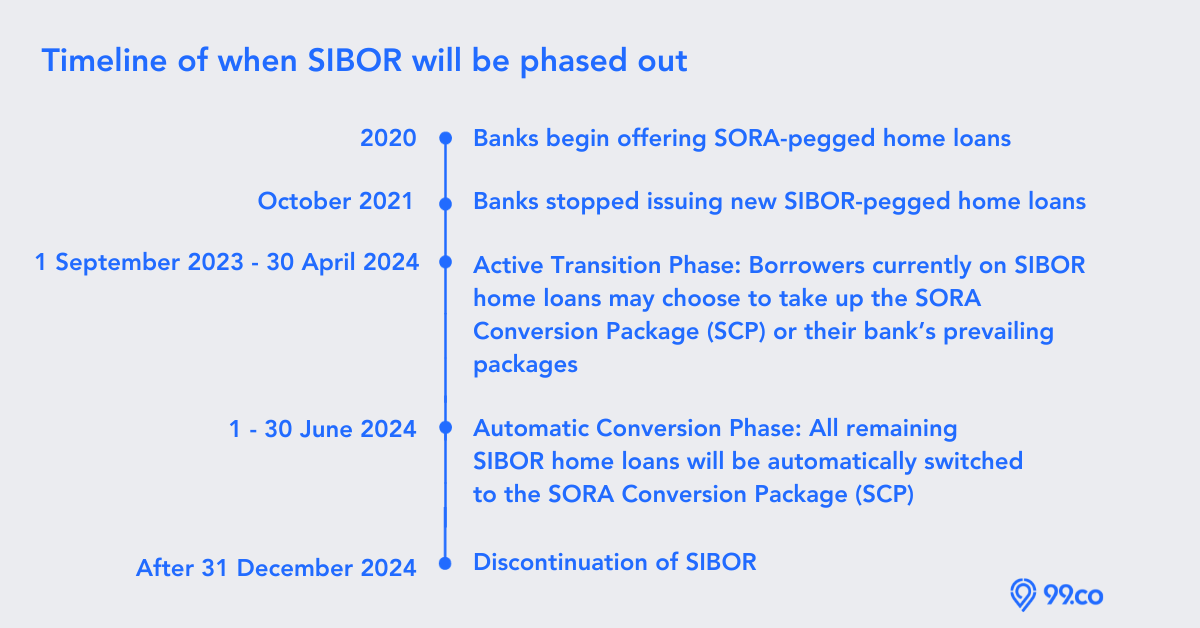If you have a housing loan in Singapore, chances are that you would have heard the terms SIBOR (Singapore Interbank Offered Rate) and SORA (Singapore Overnight Rate Average). The former is set to be discontinued after 31 December 2024. In fact, banks have not been issuing new SIBOR-pegged loans since October 2021.
With SIBOR set to be discontinued after 31 December 2024, borrowers are encouraged to proactively switch your SIBOR-based home loans to a SORA-based one or any other prevailing home loan packages offered by your banks by 30 April 2024, before the automatic conversion kicks in starting 1 June 2024. SORA is a more robust and transparent interest rate benchmark administered by The Monetary Authority of Singapore (MAS) and computed based on actual transactions.
Don’t worry if you are confused on how to go about it. We will break it all down for you and explain what you can do to ensure a smooth transition from your current SIBOR-based home loan.
Understanding housing loans
The home loans available in Singapore can broadly be divided into three categories:
- Fixed rate loans (borrower can “lock-in” a rate that doesn’t change in the stipulated period of typically two to three years, then becomes a floating rate loan thereafter)
- Floating rate loans (interest dependent on “reference rates” that fluctuate)
- Hybrid loans (some banks offer their own customizable loans which is a mix of both fixed rate and floating rate)

Borrowers currently on SIBOR home loans can choose to switch to an alternative home loan by 30 April 2024 i.e. the SORA Conversion Package or your bank’s prevailing packages.
If no action is taken by 30 April 2024, your outstanding SIBOR home loan will automatically be converted to the SORA Conversion Package come June 2024 as interest payments can no longer be calculated for SIBOR after 31 December 2024.
SORA – A robust methodology
SORA is defined as the volume-weighted average rate of actual borrowing transactions in the overnight interbank Singapore Dollar (SGD) cash market in Singapore between 8am and 6.15pm, and SORA rates are published by 9am the next business day on the MAS website.
What you need to know, is that SORA home loan packages reference Compounded SORA rates of 1-month, 3-month and 6-month tenors, which MAS also publishes daily. As Compounded SORA rates are calculated based on an average of actual borrowing transactions over a given period (of 1, 3 or 6 months), the interest rates tend to be more robust and less volatile.
SIBOR, on the other hand, is the average rate at which Singapore banks estimate that they can borrow money from each other via the interbank market.
Check out: The SORA Transition Roadmap
Options available to switch from SIBOR to SORA
With existing SIBOR-based home loans set to be phased out, it is important that borrowers get a clearer understanding of what options are available by speaking to their respective banks.
From now till 30 April 2024, the options available to homeowners are:
1) Prevailing packages offered by your bank
2) SORA Conversion Package (SCP)
You can opt for the prevailing packages offered by your bank which may include fixed, floating or hybrid home loan packages. This includes floating rate packages based on SORA that banks offer, which are typically based on 1-month or 3-month Compounded SORA, as well as board rate loans.
Alternatively, you may opt for the SORA Conversion Package (SCP), which is a floating rate package based on 3-month Compounded SORA, that has been created for the purpose of this transition. More details on the SCP are provided in the next section.
You are encouraged to reach out to your bank to find out what prevailing packages are available. Banks are currently offering their customers an easy switch to another home loan without any additional fees or lock-in period – something homeowners can look to benefit from. TDSR calculation considerations are also exempted, when the customer switches from their SIBOR loan to an alternate package offered by the same bank.
If no action is taken by 30 April 2024:
Banks will auto-convert all remaining SIBOR home loans to the SCP in June 2024. More details on the SCP are provided in the next section.

Active Transition Phase: 1 September 2023 to 30 April 2024
The time period between 1 September 2023 to 30 April 2024 is called the Active Transition Phase. During this period customers have the option to take up either the SCP or their bank’s prevailing packages which can include SORA and non-SORA loans (e.g. fixed or board rate).
The SCP during this phase is structured as:
3-month Compounded SORA
+ customer’s existing SIBOR margin
+ Adjustment Spread (spot-spread)
3-month Compounded SORA (published by MAS here) is used in the SCP as it is more stable than the 1-month compounded SORA and less lagged than the 6-month compounded SORA.
If you currently have a SIBOR home loan, the margin is represented by a percentage added to the 1-month or 3-month SIBOR rate.
The Adjustment Spread (defined as spot-spread for the Active Transition phase) is published by ABS Benchmarks Administration Co on the first Singapore business day of each month, until April 2024. There are two categories of adjustment spot-spreads, depending on whether you currently have a 1-month or 3-month SIBOR loan.
The respective spreads will be used for customers converting their SIBOR loans to the SCP in that same month. For example, if the conversion to the SCP takes effect in December 2023, the corresponding December 2023 adjustment spot-spread will be applied. After the conversion, the adjustment spread applied will remain fixed for the remaining tenor of the loan.
Automatic Conversion Phase: 1-30 June 2024
If you choose to do nothing by 30 April 2024, your bank will convert your SIBOR home loan to the SCP in June 2024. However, in this case, the adjustment spread used will be based on the 5-year historical median spreads between the applicable SIBOR and 3-month Compounded SORA over the period 30 June 2018 to 30 June 2023.
The SCP for the Automatic Conversion Phase is structured as:
3-month Compounded SORA
+ customer’s existing SIBOR margin
+ Adjustment Spread (historical median)
The adjustment spreads (historical median) are:
0.2426% for 1-month SIBOR to 3-month Compounded SORA or 0.3571% for 3-month SIBOR to 3-month Compounded SORA
Again, it depends on what type of SIBOR home loan you currently have. If you’re not sure, please speak to your bank.

Take Early Action
Given that a mortgage is likely to be one’s greatest financial liability, it is important that homeowners choose and manage their home loans after careful consideration.
Borrowers currently on a SIBOR-based home loan should start planning their next step before the Active Transition Phase ends in April 2024. Consult your bank, talk to financial experts and get advice from trusted property mortgage brokers to help you evaluate your financial needs and come to a conclusion on which loan package works best for you.
Learn more at: https://abs.org.sg/sibor
The post Transition of SIBOR Loans to SORA: Switch by 30 April 2024 appeared first on .

